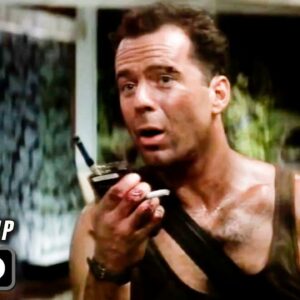Bruce Willis, a name synonymous with action-packed blockbusters, heartfelt performances, and a career spanning multiple decades, has become a beloved figure in Hollywood. Yet, beneath the tough-guy persona lies a man who has faced personal and professional challenges that have shaped not only his career but also his character. From his humble beginnings to his resilience in the face of hardship, Bruce Willis’s journey offers an inspiring narrative about personal growth, resilience, and how one can overcome life’s obstacles.
Early Life and Struggles
Bruce Willis was born on March 19, 1955, in Idar-Oberstein, West Germany, to a U.S. soldier father and a homemaker mother. He was the eldest of four children in a working-class family. The Willis family relocated to the United States when Bruce was just two years old, settling in Penns Grove, New Jersey. Growing up, Willis faced the challenges that come with being part of a modest household. His father’s struggle with alcoholism and his parents’ eventual divorce marked his formative years, forcing Bruce to mature faster than most children his age. These early experiences of hardship and instability played a crucial role in shaping the man he would become, giving him the toughness and resilience that would later define his career.
Despite the challenges at home, Bruce had a natural gift for acting. He found solace in theater and quickly became involved in school plays, using acting as a way to escape the difficulties of his personal life. After high school, Willis attended Montclair State University in New Jersey, where he studied acting. However, like many aspiring actors, he faced his fair share of struggles breaking into the entertainment industry.
Bruce moved to New York City to pursue his dreams, where he took on various jobs, including working as a bartender, to support himself. For a time, it seemed like success in the entertainment industry was out of reach. He struggled to land significant roles and had to deal with the rejection that many aspiring actors face. It was during these early years that Bruce learned the value of perseverance—an attribute that would serve him well throughout his career.
Resilience in the Face of Challenges
One of the defining qualities that Bruce Willis has displayed throughout his career is resilience—the ability to bounce back from setbacks and failures. In the early 1980s, Bruce faced multiple rejections before landing his breakthrough role as David Addison on the TV series Moonlighting (1985–1989). At the time, Willis was an unknown actor, and his casting in the romantic comedy-drama series was seen as a gamble by producers. However, Willis’s charismatic performance, combined with his wit and charm, made the show a huge success.
Despite the show’s popularity, Bruce faced challenges beyond the entertainment industry’s demanding schedules. The fame that came with Moonlighting was both a blessing and a curse, as it led to intense public scrutiny. Yet, Bruce faced it all with a calm and composed demeanor, never letting his rise to stardom cloud his focus or his commitment to his craft.
Bruce’s move from television to movies was not without its struggles. In the early 1990s, many were skeptical about his ability to transition from television actor to Hollywood leading man. This skepticism reached its peak when Bruce was cast as the lead in Die Hard (1988), a film that would become a defining moment in his career. At the time, Bruce was not the typical action hero, and his casting was met with surprise. Critics questioned whether he could pull off the role of John McClane, a tough New York cop, in a high-stakes action movie.
However, Bruce proved them wrong. Die Hard became an iconic film, cementing Bruce Willis as a leading actor in Hollywood. The movie’s success catapulted him into superstardom, but the road to success had not been easy. He had to constantly fight against expectations and prove his worth. The lessons Bruce learned during these struggles—grit, self-confidence, and the ability to overcome doubts—would define his career moving forward.
Bruce’s resilience was tested again during his post-Die Hard years. After enjoying success as an action star, he faced challenges with typecasting, with audiences often seeing him solely as the action hero. Yet, rather than being confined by this label, Bruce expanded his range by taking on roles in diverse genres, including drama and comedy. He worked with renowned directors like Quentin Tarantino in Pulp Fiction (1994) and M. Night Shyamalan in The Sixth Sense (1999). His willingness to take risks and step outside of his comfort zone was a testament to his growth as an actor.
Learning from Relationships
Bruce Willis’s personal life has been the subject of much media attention, and his relationships have played an integral role in his growth as a person. His first marriage to actress Demi Moore in 1987 was one of Hollywood’s most high-profile unions at the time. Together, they had three daughters, and Bruce’s role as a father became a central part of his life. While the couple eventually divorced in 2000, Bruce and Demi remained on good terms, co-parenting their children and maintaining a strong relationship for the sake of their family.
In many ways, Bruce’s experience as a father taught him valuable lessons about responsibility, humility, and the importance of relationships. Bruce has often spoken about the joy and fulfillment he finds in being a father, and his dedication to his children has been a constant throughout his career. As his children grew older, he became more open about his role as a parent, showing a more vulnerable and caring side of himself that contrasted with his tough-guy persona in the media.
Bruce’s second marriage to model and actress Emma Heming in 2009 marked another significant chapter in his life. Together, they have two daughters, and Bruce has expressed how his second marriage has brought him even greater fulfillment. The lessons he learned from his first marriage helped him build a stronger foundation in his second relationship, and Bruce’s growth as a partner and father has been evident in his personal life.
Through his relationships, Bruce learned that personal growth comes from not just career achievements, but also from the love and support of family. The joy of fatherhood, the challenges of maintaining a healthy relationship, and the strength that comes from family ties have played a crucial role in Bruce’s development as a man. These experiences have helped him become more grounded and self-aware, qualities that he continues to carry with him.
Career Evolution
Bruce Willis’s career has been marked by its remarkable evolution. Initially known for his action-packed roles, Bruce successfully transitioned to more nuanced and complex characters. His willingness to take on diverse roles across different genres allowed him to stay relevant in Hollywood while continuing to challenge himself as an actor. One of the key turning points in Bruce’s career came with his role in The Sixth Sense (1999), a psychological thriller that proved he could excel in dramatic roles. His portrayal of Dr. Malcolm Crowe earned him critical acclaim and demonstrated that he was much more than just an action star.
Another pivotal moment in Bruce’s career was his collaboration with director Quentin Tarantino in Pulp Fiction (1994). Playing the character of Butch Coolidge, a boxer on the run, Bruce embraced the challenge of working with a director known for his unconventional storytelling. Pulp Fiction became a cultural phenomenon, further cementing Bruce’s reputation as a versatile actor capable of tackling a wide range of roles.
Bruce’s career has not only been defined by his success in movies but also by his ability to adapt to new trends in the entertainment industry. He embraced new technologies early on, such as starring in the 1990s interactive video game Die Hard Trilogy. This willingness to evolve and remain relevant in the changing landscape of Hollywood speaks to Bruce’s commitment to personal growth and professional development.
Health and Wellness
As Bruce’s career progressed, so did his awareness of the importance of health and wellness. In the face of Hollywood’s grueling demands, Bruce has always prioritized his physical and mental well-being. His commitment to fitness is well-known, with the actor often performing his own stunts in action films, which requires a high level of physical conditioning. Bruce’s training regimen and discipline in maintaining his fitness allowed him to remain a top-tier action star well into his 50s.
However, as time passed, Bruce’s approach to health evolved. In addition to physical fitness, he became more attuned to mental health and wellness. Bruce has spoken openly about the challenges of aging and how he learned to embrace vulnerability as he grew older. His openness about these struggles has helped to destigmatize conversations about mental health, especially in an industry where maintaining a strong, invulnerable image is often expected.
Bruce’s wellness journey also highlighted the importance of balance. While he worked tirelessly on his career, he found peace in spending time with family and friends, finding balance between work and personal life. This shift in mindset has allowed him to navigate the challenges of fame and aging with greater grace.
Facing the Unknown
In recent years, Bruce’s resilience has been tested in ways he could never have anticipated. In 2022, Bruce was diagnosed with aphasia, a condition that affects speech and language skills. This diagnosis has had a profound impact on both his personal and professional life. Yet, in the face of this challenge, Bruce has shown incredible courage. He publicly shared his diagnosis with fans, emphasizing the importance of family support and his commitment to continuing to live life to the fullest.
Bruce’s willingness to embrace vulnerability, even in the face of the unknown, is a testament to the growth and maturity he has achieved over the years. He has become a symbol of strength, not because he is invulnerable, but because he has learned to embrace change and the challenges that come with it. This acceptance of vulnerability has inspired countless fans and individuals who face their own struggles, teaching them the power of resilience and self-compassion.
The Legacy of Personal Development
Bruce Willis’s journey is more than just a tale of stardom; it is a testament to the power of personal growth and resilience. Through his struggles, relationships, career evolution, and dedication to health, Bruce has become a symbol of strength, vulnerability, and perseverance. His story continues to inspire both his fans and those in the entertainment industry, reminding them that personal growth is not always linear, but it is always worth pursuing.
Bruce’s ability to bounce back from setbacks, his willingness to evolve as both an actor and a person, and his commitment to embracing change have left an indelible mark on Hollywood. His legacy is not only defined by his iconic roles but by the lessons he has imparted through his life: resilience, adaptability, and the importance of family. As Bruce continues to face the challenges that come with aging and health struggles, his journey remains an inspiring one for all. Through it all, Bruce Willis has proven that personal development is not just a career achievement—it is a lifelong process.





